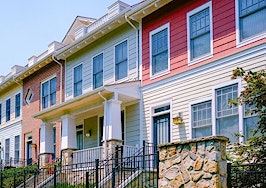For most of us, when a buyer can’t qualify for a home, it’s chalked up as a bad day.
But when an aspiring Olympic athlete doesn’t qualify for a home, it hints at a fear that many had already suspected — that the dream of homeownership can be nearly as unobtainable as a gold medal.
With very little dependable income to start with as a result of training demands and travel, not making a podium or being able to transform television coverage into corporate sponsorship usually means more time spent living with roommates, succumbing to side hustles and worse, Olympic athletes and their advocates told Inman.
“It’s mind boggling,” Rob Koehler, director general of Global Athlete, an advocacy group based in Montreal, Canada, told Inman. “It’s a tough road for them. They live on the dream of being an Olympian, and once you get that title, it doesn’t give you much in life other than a title.”
Four-time Olympian and U.S. Ski and Snowboard Team Member Stacey Cook of Mammoth Lakes, California, said that when it comes to aspiring Olympians being able to make enough to live — and maybe, someday, buy a house — they have to run themselves like a business, much like a real estate agent. And that means not being able to focus on training 100 percent of the time.
It’s a double-edged sword: without that focus, corporate sponsorships and competition prize money is harder to come by.
Cook was one of the highest-performing members on the U.S. team in the speed disciplines of downhill and super-G for years, but she still had to hustle to make money.
“I wasn’t getting paid by the U.S. Ski Team,” Cook said. “To get paid, I searched for my own sponsors, negotiated my own contracts, reaching out, doing appearances.”
Cook said that during her time with the team, training and travel expenses were covered but that those amounts have since dwindled while prize money has increased. That means an athlete’s income is more performance-based. And that’s where the pressure builds.

Stacey Cook; courtesy of Peter Morning/Mammoth Mountain
“A lot of my teammates dealt with having to fund themselves while trying to compete with the best in the world. It holds back a lot of athletes.”
Cook’s history with homeownership dates back to the Great Recession, where her parents’ early emphasis on saving paid off in the form of a foreclosed duplex, which she still owns. However, Cook never lived in the property, instead opting to rent it to make passive income.
“I was bouncing between employee housing, house-sitting projects, and living with the family of one of my former coaches,” she said. “Kinda all over the map.”
The income generated from renting the property gave her enough wiggle room to train with less pressure. She admits that her luck in staying injury free helped a lot, too.
That health and consistent performance was enough to convince her coaches to let her stay in Mammoth Lakes while many of her peers relocated to Park City, Utah, where the national team is headquartered.
“They have to come up with the money to move there, and that’s a big challenge. All of the athletes today are priced out of the ski resort markets,” Cook said.
Olympic athletes have to perform as hard off the slope as they do on it to prepare for what comes after victory.
“You have to rally and figure it out,” Cook said. “It doesn’t land on your doorstep.”
Cook’s predecessor, Bill Hudson, represented the U.S. Olympic Ski Team in 1988. He had to make it work in a resort market, too. In his case, Lake Tahoe, California.
He was a member of the ski team at Dartmouth University when he got the national team appointment. As is common among those within reach of such athletic notoriety, Hudson left school to train.
A common result of such scenarios is the pursuit of financial stability getting sidelined. It might live on as a back-of-mind assumption, though. Win, and the money — for a house or otherwise — will come.

Bill Hudson; Photo courtesy of Bill Hudson
“I was pretty selfishly devoted to my athletics then,” Hudson told Inman. “That’s how it went for the next eight years or so, it was 90 percent of my focus. I’d work out all summer, ski every other month until winter, then travel all winter.”
Through an array of ski brand sponsorships and the occasional VISA commercial, Hudson put enough money together to buy a condo in Olympic Valley, home to ski resort Palisades Tahoe, which hosted the 1960 Winter Olympics.
“Of course, it was probably $250,000 back then for a two-bed, two-bath,” Hudson said. “That was in 1991. It’s probably a million now.”
Hudson’s mostly correct.
As of this writing, Tahoe Luxury Properties lists a number of two-bedroom condos in Olympic Valley, ranging in price from $534,900 to $1.1 million. The former is prominently marketed as the lowest-priced two-bedroom condo in the valley.
As a self-proclaimed mid-level ski racer, Hudson recognizes he likely made a little more money than athletes in other Olympic disciplines, such as ski jumping and bobsledding.
“Those other athletes, I think they’re just finding a way to get by,” said Hudson.
The peak performers, such as snowboarder Chloe Kim and alpine skier Mikaela Shiffrin, are financial standouts in their respective fields, earning millions in big brand sponsorships. Such are the spoils of winning.
While an athlete’s national program may cover training and travel expenses, the International Olympic Committee does not pay athletes for reaching the playing field. The United States Olympic Committee (USOC) rewards medalists through Operation Gold.
Gold medal winners now get $37,500 for each win, $22,500 for a silver and $15,000 for bronze. That’s certainly something.
But medals at any level aren’t easy to win: this is what makes Olympic glory so coveted.
More over, that’s hardly life-changing money when juxtaposed with the national median home price, which hit $361,171 in December 2021. In June of last year, it peaked at $386,000.
Koehler said that many aspiring competitors miss out on critical career growth and earning years. They can also miss out on down real estate markets.
“If they start heavy training when normal people are going to university or starting a job, they basically put that [more normal career path] on hold for 10 to 15 years,” Koehler said to Inman in a phone call. “So while their peers are working and gaining income, and potentially saving for or buying a home, an Olympian is scraping by.”
In short, being eligible for gold doesn’t equate to being able to compete for a home.

Rob Koehler; courtesy of Global Athlete
Ahead of the COVID-19-delayed Tokyo Olympic Games in 2020, Global Athlete conducted a survey to gauge the overall wellbeing, including financial stability, of those who compete at the highest level on the world stage. Respondents consisted of 200 Olympians or Paralympians, and others who performed for their country or internationally.
More than half — 58 percent — said they considered themselves financially unstable.
On the topic of athletes receiving appropriate compensation from the IOC, 77 percent answered “no,” and 67 percent responded the same when asked if their government provided adequate compensation.
Koehler said the IOC makes enough to pay every athlete.
“This is a multi-billion industry and the athletes are being used as pawns, it would be very easy for the IOC to pay out each athlete at least $25,000.”
The IOC only recently partially adjusted Rule 40, a statute that greatly limited athletes ability to economically benefit from their performance during the Olympics, but advocates say the rule wasn’t loosened enough to make a significant difference.
About Rule 40, Global Athlete concluded in its study, “Short of becoming a for-profit organization and compensating its athletes with salaries, there are indirect ways the committee could give back such as increased awards, scholarships, and training for life after the Olympics.”
“They have to totally relax Rule 40,” Koehler said. “It works in other sports, tennis players can wear their own gear, golfers have their own sponsors displayed. There’s so much fat and money being distributed by administrators, and not to the athletes.”
Park City-based aerial skier Emily Cook (no relation) has finally settled into her post-Olympic life, which she can trace back to her first real estate purchase in 2003, a townhome.
“As a 23-year-old with potentially inconsistent income, it was scary, I was incredibly nervous [to buy a house],” Emily told Inman about her first home.
Now retired, the highly decorated aerial skier competed in three Olympic games, as well as on the World Cup circuit.

Emily Cook, airborne. Photo: emilycook.com
Emily would have been in four Olympics had she not broken both feet before the 2002 games, missing her chance to perform in front of her hometown of Salt Lake City, Utah.
When injuries happen, competition prize money dries up. Plus, not many banks want to finance a person with hard-to-verify income that comes from unreliable sources.

Emily Cook; emilycook.com
“You have to be at the top of your game all the time and not get injured,” she said.
To qualify for a house, you need to stand on podiums. A tenth of a second or a botched landing can make all the difference.
Emily considers herself very fortunate. Her father was in finance and encouraged her to put her money into the property, stressing that down the road, she’ll be happy she did.
“He was right, it was definitely the best decision I made,” she said, adding “I just sold that house to buy what we’re in today.”
Fortunately, Emily had a few loyal sponsors see her through her injury, which isn’t the case for most athletes. Many sponsors aren’t as patient.
Like Hudson’s first condo, Emily’s place in Park City was quite a bit more affordable than what she recently purchased with her partner, new baby and dog.
“I can’t imagine trying to find a down payment now, never mind getting a mortgage. Can you can get a mortgage with an inconsistent income?” she asked. “They [Olympic athletes] don’t have a job with a paycheck every other week.”
Emily ended up housing a number of her friends and teammates in her townhouse. Packing into apartments with friends is the only way many aspiring Olympians can make it work, especially when training facilities are located in such expensive markets.
“The only way I could ensure I made my mortgage every month was by having a bunch of roommates,” she said. “We definitely had more in there than the two bedrooms could comfortably accommodate.”
Some of those one-time roommates managed to win gold last week in the inaugural Mixed Team Aerials. Emily was their coach prior to retiring.
“I hope they find some financial success from that, but that’s not why any athlete gets into the sport.”







